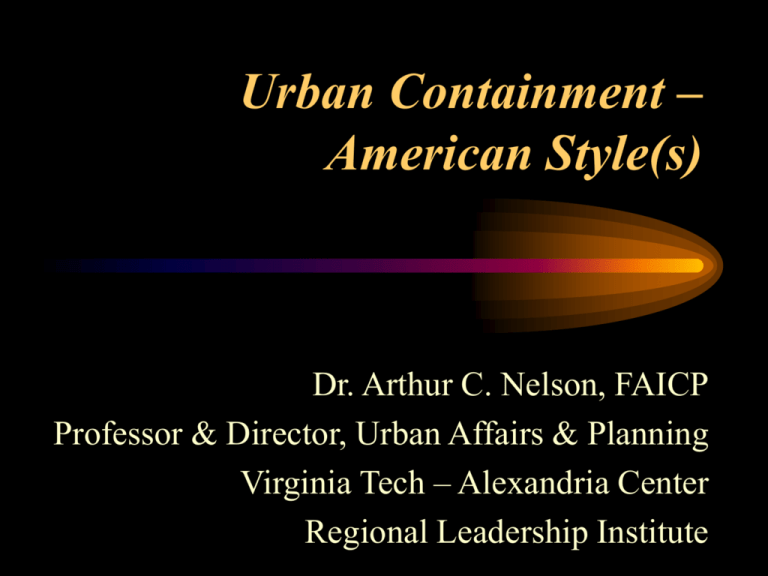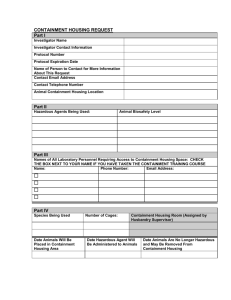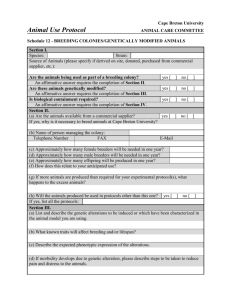View Presentation Here - Munk School of Global Affairs
advertisement

Urban Containment – American Style(s) Dr. Arthur C. Nelson, FAICP Professor & Director, Urban Affairs & Planning Virginia Tech – Alexandria Center Regional Leadership Institute Urban Containment – God’s Will? “The Lord said to Moses . . . Command the people of Israel, that they give to the Levites . . . cities to dwell in; and pasture lands round about the cities . . . The pasture lands of the cities . . . shall reach from the wall of the city outward . . . all around. “The city shall be in the middle…” Numbers 35: 1-5. Goals of Urban Containment • Preserve public goods. • Minimize adverse land use interactions and maximize positive ones. • Minimize taxpayer exposure. • Distribute benefits & burdens equitably. • Improve overall quality of life. “Best” Containment Practices • Urban Growth Containment Boundary • Resource land preservation • Infill, redevelopment, aka “refill” • Inclusionary housing • Regional asset sharing • Multi-modal accessibility • Responsiveness to change Emerging Empirical Evidence • Containment/growth management improves economic development. • Containment prevents beltways & increases retail/service trade. • Containment increases farming. • Containment reduces racial segregation. • Containment makes jobs more accessible to low/mod-incomes. • Containment eliminates blight. Downsides • Threatens existing neighborhoods. • Raises housing prices by making area more attractive & economically efficient. • Can decrease homeownership (though just the opposite can also happen). • Increases infrastructure costs in near-term. • Pushes some economic activities out. • Reduces opportunity to live on large lots. Different Flavors of Urban Containment • Urban Services & Facilities • Urban Growth Phasing • Rural Growth Management • Rural/Open Space Preservation • Intergovernmental Agreements Urban Services & Facilities • Urban Service Area • Infrastructure Phasing • Municipal Boundary • Level of Service Standards • Spatial Capital Investment • Special Service Districts • State Priority Funding Areas Urban Service Area • Limits geographic extent of service. • Rural areas denied urban services. • Typical of water and wastewater. Infrastructure Phasing • Plans for location and timing of future urban service extensions. • Plan is basis for capital improvement investments. • Example: Sioux Falls, SD, 2015 Growth Management Plan. Municipal Boundary • Key facilities and services provided only by municipality. • Access to key facilities and services attained only through annexation. • Example is Lincoln, Nebraska. Level of Service Standards • Performance standards for urban services vary spatially between “urban” and “rural” land uses. • Example: Palm Beach County, Florida, where rural areas are not allowed to have public/community water and sewer. Spatial Capital Investment • Focuses new infrastructure investments in existing or planned urban areas. • Example: Maryland’s “priority” investment areas. • Example: Delaware Valley Regional Planning Commission. Special Service Districts • Sole provider of key public facilities and services. • Adopts policy of limiting infrastructure extensions to areas targeted for urban development. • De factor urban service limits. • Example: Baltimore County, Maryland. State Priority Funding Areas • State infrastructure investments targeted to urban and urbanizing areas based on state criteria. • Local governments may invest in other areas but at their own expense. • Maryland statewide for roads, water, sewer and schools. • Colorado in metropolitan areas for transportation. Urban Growth Phasing • Tiered Growth Strategy • Urban Reserve District • Public Land Management Tiered Growth Strategy • “Rings” of development intensity and infrastructure provision. • Pricing strategies often used. • Example: Tucson’s “central core”, “midcity”, “evolving city” and “future city” tiers each with different planning and design standards. Urban Reserve District • Special areas reserved for future urban-scale development at the urban fringe. • Usually reserved through large lot zoning, nonurban infrastructure, and “shadow” platting. • At appropriate time, urban infrastructure installed and urban scale development allowed. • Example: San Luis Obispo. Public Land Management • Preserve publicly-owned land from development. • Potentially “trading” some publicly-owned land where development should occur with owners of rural land where development should not. • Example: Pima County, Arizona. Rural Growth Management • Agriculture/Open Space District • Urban Fringe Resource Management • Rural Growth Monitoring Agriculture/Open Space District • Exclusive farm, forest, and other open space uses allowed. • Very large minimum lot sizes. • No or few “urban” residences allowed. • Example: Wicomico County, Maryland. Urban Fringe Resource Management • Overlay district in rural areas where new development reviewed under stringent standards to protect habitat, sensitive landscapes, etc. • Resource management plans required. • Example: Chico, California. Rural Growth Monitoring • Projected demand for legitimate development of rural lands undertaken. • Selected rural lands allocated for low density urban development not using key urban facilities and services. • Example: King County, Washington. Rural/Open Space Preservation • Transfer of Development Rights • Purchase of Development Rights • Urban Fringe Land Acquisition • Urban/Rural Buffer • Community Separator Transfer of Development Rights • Development rights are assigned to rural “sending” areas but cannot be exercised unless purchased by developer and transferred to urban “receiving” areas. • Example: Pinelands, New Jersey. Purchase of Development Rights • Development rights assigned through a planning process based on reasonable factors are purchased by local government through a voluntary purchase program. • Can also include privately donated conservation easements. • Example: King County, Washington. Urban Fringe Land Acquisition • Urban fringe land identified and targeted for acquisition in conscientious effort to contain urban development. • Special state and regional funds typically used, but sometimes done by local government. • Examples: Boulder, Colorado; Maryland. Urban/Rural Buffer • Small scale greenbelt edge around city. • Land acquired through combination of acquisition and donation with conservation easement. • Privately owned land not provided with key urban services and limited to open space uses. • Example: Davis, California. Community Separator • Narrow band of open space separating one community from another. • Land uses restricted to nonurban activities; no urban services allowed. Essentially large lot residential zoning but with some land acquisition. • Example: Sonoma County, California. Intergovernmental Agreements • Joint Planning Areas • Spheres of Influence • Extraterritorial Jurisdiction Joint Planning Areas • Municipalities agree on land use development affecting unincorporated areas. • Agreements implemented through interlocal agreement enforceable by any party. Spheres of Influence • State designates future annexations areas of municipalities and creates independent board to assure that development in affected unincorporated areas are consistent with overall development plans of the relevant municipalities. • Example: California, Local Agency Formation Commission (LAFCo). Extraterritorial Jurisdiction • Legislature authorizes municipalities to review and approve subdivisions, rezoning requests, and other land use actions in unincorporated areas within 15 miles typically. • Example: Eau Claire, Wisconsin. American-Style Urban Containment Is Creative & Flexible But what Really Works?






